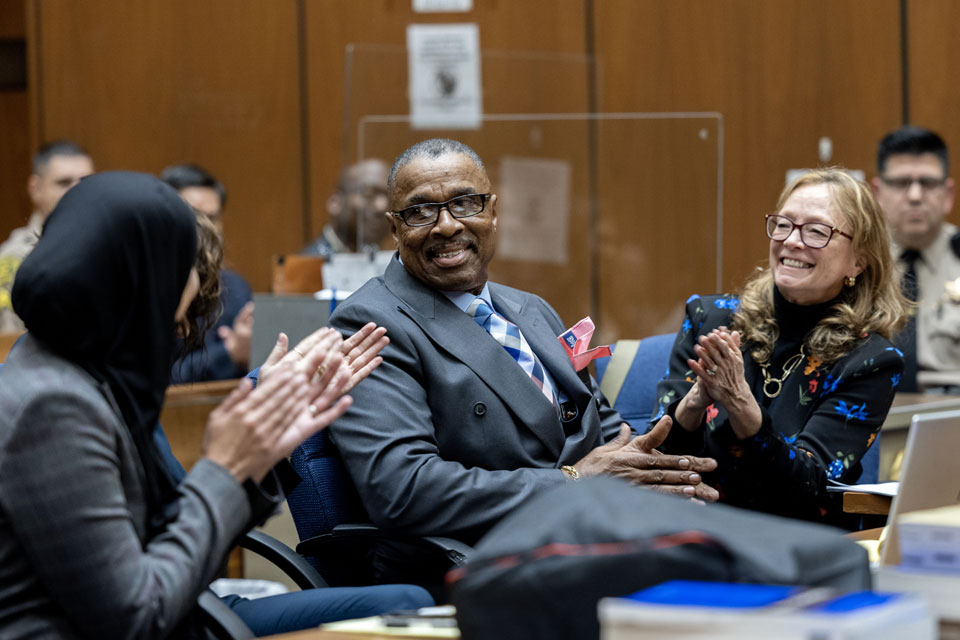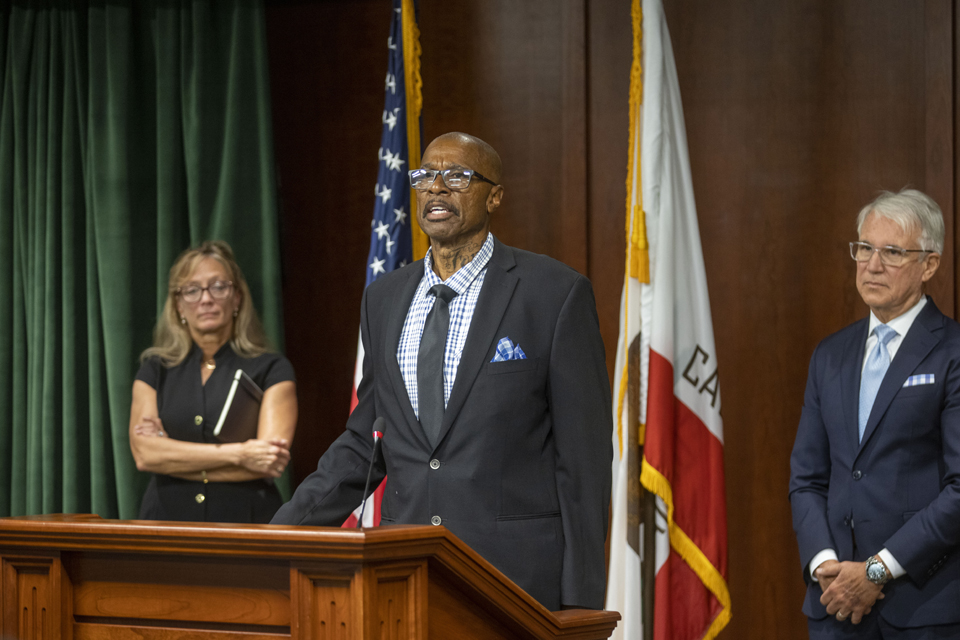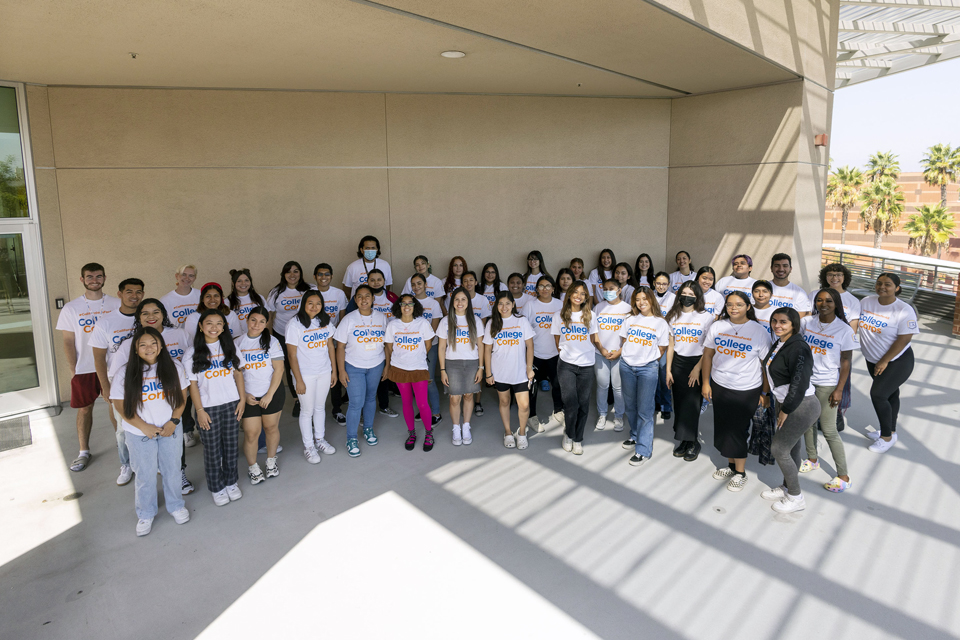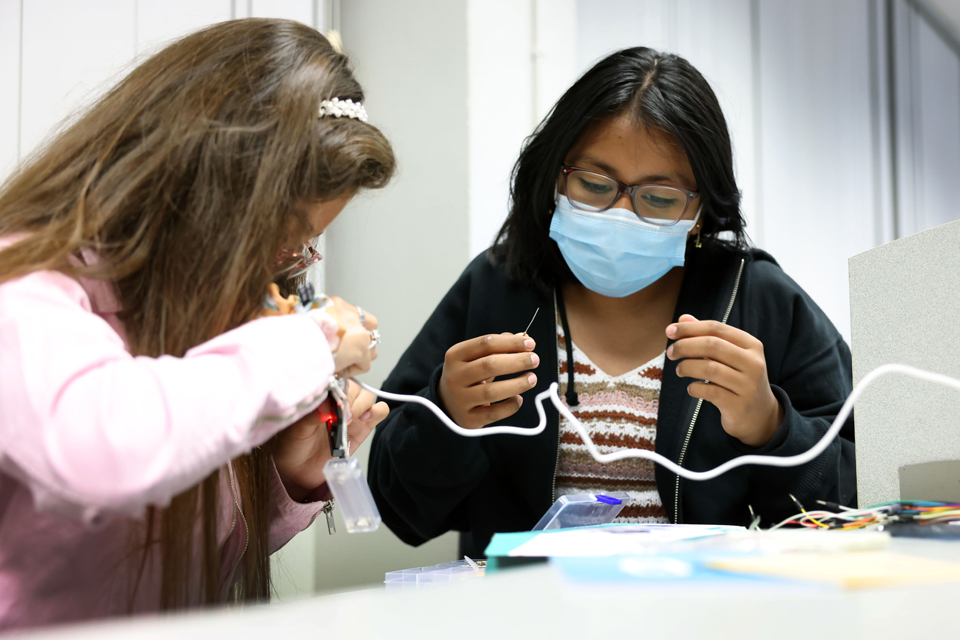Maurice Hastings, who was wrongfully imprisoned for 38 years and was freed through the work of the Los Angeles Innocence Project at Cal State LA, was declared factually innocent on Wednesday.
A finding of factual innocence means the court declared Hastings innocent of the 1983 abduction and murder of a woman in Inglewood, California, for which he was wrongfully convicted, and clears the arrest and prosecution from his record.
“It means a lot. I’m grateful for the judge’s ruling, and the apologies—everything has been wonderful today,” Hastings said following the March 1 court hearing in the Clara Shortridge Foltz Criminal Justice Center in Downtown Los Angeles. “I’m ready to move on with my life. I’m a happy man today.”
Hastings was freed in October after the Los Angeles Innocence Project at Cal State LA worked with Los Angeles County District Attorney George Gascón’s Conviction Integrity Unit to demonstrate that new DNA test results pointed conclusively to another suspect and warranted Hastings’ immediate release. Los Angeles County Superior Court Judge William C. Ryan vacated Hastings’ conviction, dismissed the case, and ordered his release from custody.
It was in that same courtroom more than four months later that Hastings learned he was found factually innocent in the eyes of the law. Deputy District Attorney Martha Carrillo of the Conviction Integrity Unit delivered a public apology to Hastings in open court on behalf of the Los Angeles County District Attorney’s Office.
Hastings nodded as Carrillo spoke, smiling and holding back tears at times as he was supported by his attorneys from the Los Angeles Innocence Project at Cal State LA.
“Although Mr. Hastings was released in October 2022 from custody, the court’s finding of factual innocence is crucial to ensuring that justice is truly done in this case,” Los Angeles Innocence Project staff attorney Ayesha Hussain said in court. “There is now no dispute that no evidence exists linking Mr. Hastings to the actual perpetrator of the horrendous crimes that occurred in June 1983.”
Gascón announced at a Feb. 28 news conference at Cal State LA that his office’s investigation agreed with the Los Angeles Innocence Project at Cal State LA that Hastings did not commit the 1983 murder and that they would be joining the request for a finding of factual innocence from the court.
DNA testing conducted on behalf of Hasting’s attorneys excluded Hastings and identified the actual perpetrator. The California Forensic Science Institute at Cal State LA, led by Professor Katherine Roberts, worked with Hastings’ post-conviction counsel to secure a court order for the DNA testing of the newly rediscovered evidence at an independent laboratory. The DNA testing was funded by a grant from the Bureau of Justice Assistance at the U.S. Department of Justice.
No physical evidence linked Hastings to the 1983 murder for which he was arrested and convicted; and numerous alibi witnesses attested to his whereabouts during the crime. Prosecutors sought to impose the death penalty following Hastings’ guilty verdict, but the jury instead sentenced him to life in prison without the possibility of parole.
Biological evidence collected from the victim as part of a sexual assault kit had been preserved but never DNA tested, despite Hastings’ repeated requests dating back decades.
“I have been incarcerated for over fifteen years for a murder that I did not commit,” Hastings wrote in a letter to the Los Angeles County District Attorney’s Office in 2000. “The most compelling of the evidence that has not as of yet been examined is the DNA evidence which will conclusively show that I was not the person involved with the deceased at the time of the crime.”
That evidence—an oral swab from the victim that contained semen—was tested in June 2022 and excluded Hastings. The testing also produced a new DNA profile that matched Kenneth Packnett, who the District Attorney’s office has determined was the actual killer and who died in prison in 2020 while serving a sentence for kidnapping and rape.
“Cases like Mr. Hastings’ underscore the critical importance of the work of the Los Angeles Innocence Project at Cal State LA, Professor Katherine Roberts in our School of Criminal Justice and Criminalistics and others fighting to free the wrongfully convicted,” said Cal State LA President William A. Covino.
Roberts is the executive director for the California Forensic Science Institute at Cal State LA and director of the School of Criminal Justice and Criminalistics’ criminalistics graduate program in the Rongxiang Xu College of Health and Human Services.
“It’s just so rewarding—not just for me personally, but for our graduate students in criminalistics and undergraduate criminal justice students—to see the outcome of Mr. Hastings’ exoneration,” Roberts said. “Without the DNA testing, I think we wouldn’t be here today. We really do appreciate the funding we received from the federal government.”
The Los Angeles Innocence Project launched at Cal State LA in August 2022. Through the groundbreaking new partnership, the project’s team of experienced post-conviction attorneys work alongside faculty and students in the university’s California Forensic Science Institute and School of Criminal Justice and Criminalistics to investigate cases of individuals with credible claims of actual innocence, and to litigate those claims where new evidence supports overturning a conviction.
“This partnership saves lives and gives forensic science and criminal justice students at Cal State LA invaluable access that ties directly into the university’s commitment to engagement and service for the public good,” said Jose A. Gomez, Cal State LA provost and executive president. “Through the Los Angeles Innocence Project at Cal State LA, we are transforming the ideal of ‘justice for all’ into a reality for more.”
Inside the courtroom Wednesday afternoon, Hastings sat alongside his attorneys, including Paula Mitchell, director of the Los Angeles Innocence Project at Cal State LA.
Judge Ryan told Hastings that he granted the joint request for a finding of factual innocence and signed the order making it official.
“All right, Mr. Hastings, good luck to you. I hope things work out for you,” Ryan said. “Anything else, Ms. Mitchell?”
“Permission to applaud?” Mitchell asked.
As the judge said yes, the courtroom erupted in celebration for the long-awaited ruling.
You can learn more about the Los Angeles Innocence Project at Cal State LA and support their work by visiting their website.
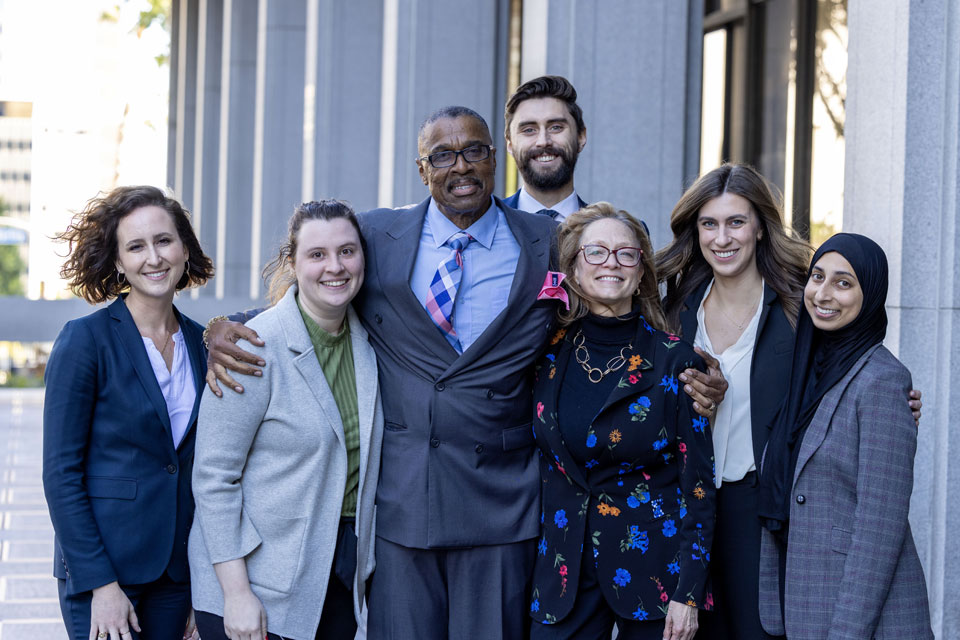
# # #
California State University, Los Angeles is the premier comprehensive public university in the heart of Los Angeles. Cal State LA is ranked number one in the United States for the upward mobility of its students. Cal State LA is dedicated to engagement, service, and the public good, offering nationally recognized programs in science, the arts, business, criminal justice, engineering, nursing, education, and the humanities. Founded in 1947, the University serves more than 26,000 students and has more than 250,000 distinguished alumni.
Cal State LA is home to the critically-acclaimed Luckman Fine Arts Complex, Pat Brown Institute for Public Affairs, Hertzberg-Davis Forensic Science Center, Hydrogen Research and Fueling Facility, Billie Jean King Sports Complex and the TV, Film and Media Center. For more information, visit www.CalStateLA.edu.

